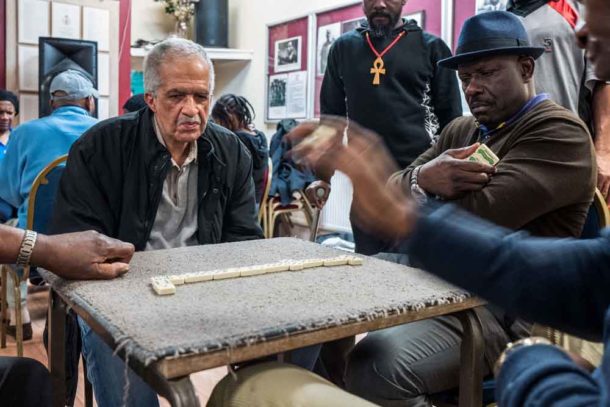Ahead of the 70th anniversary of the arrival of the Empire Windrush and amid the political storm over the treatment of the Windrush generation, Tevye Markson visited the Clapham Eagles dominoes club to talk to photographer Jim Grover and team captain Trevor Neil about Jim’s new photography exhibition

Jim Grover’s Windrush: Portrait of a Generation is a photo-story of the first generation of African-Caribbeans to migrate to the UK.
The SS Empire Windrush arrived from Jamaica at Tilbury in 1948. Around half of its migrants were housed in an underground wartime shelter in Clapham. Many “signed on” at the Brixton Labour Exchange.
Jim, an award winning Clapham-based photographer, met Trevor Neil, 70, at their church.
Trevor migrated to the UK from Jamaica in 1963, just after the government restrictions came in.
“When it started to get cold I thought: ‘why did I come here’? But you get used to it.
“In the younger days, life was good. Growing up in the 60s, there was a lot of prejudice but I never really got involved in fighting.”
Trevor learnt dominoes as a boy in Jamaica and has been playing it regularly since the early 1980s when he formed the Clapham Eagles team.
“Dominoes brings people together,” says Trevor. “I know a lot of people and places just through dominoes.”
Jim Grover wanted to capture traditional life in South London unseen by mainstream media; Trevor invited him into his community.
He walked into the club for the first time as a stranger with a camera. People had no idea what his intentions were or whether to trust him. But Jim has visited the club every week since last June and says one conversation led to another. Over time, he was accepted into the community.
“Dominoes is a joy to play,” says Trevor, “especially if you’re playing someone better than yourself and you beat them. It’s like scoring a goal in football.”
Photographing dominoes is difficult, but, says Jim: “The more you spend time, the more you anticipate what may happen. You can start to judge if they’re going to slap the table.”
The original project was just the Dominoes club. but one conversation led to another and the project expanded.
“I wanted to try to capture the totality of West Indian life,” says Jim.
Over the past ten months, he has been invited into the homes, clubs, churches and memorials of members of the Windrush generation, now in their late 60s to 90s, who still live in Brixton and Clapham.
He went to a family event in Brixton where there were four generations. Grandmother Hermione met Lester in Kingston while waiting for the ship to London. They were on the boat for two weeks, and ended up marrying.
Jim learnt about pardner saving schemes, Jamaican front rooms and nine nights, a tradition that marks the passing of a loved one. People sing and drink rum at the graveside and the men dig the earth back in.
“You’re celebrating the life of that person,” says Trevor. “It’s a joyful occasion more than being sad.”
Jim says such traditions are not as common as they used to be. They are less embedded in the second, third and fourth generations.
“If you ask a grandchild if they eat rice and peas they will say with grandma but not at home.”
“It’s about 50-50 now whether you do a nine night for your parent if you’re second generation.”
“In 20 years time some of these things will be happening much less or not at all.”
“Some of these communities are already disappearing because they don’t have enough money to keep going.”
“It is really important that the dominoes club thrives.”
Dominoes takes place every Tuesday, Thursday and Friday at the West Indian Association of Service Personnel on Clapham Manor Street, with league matches on Saturdays.
Jim’s exhibition Windrush: Portrait of a Generation runs from 23 May to 10 June at the Oxo Tower on the South Bank. Opening times are 10am to 6pm. Admission is free. Oxo Tower Wharf, Bargehouse Street, South Bank, London, SE1 9PH.
















